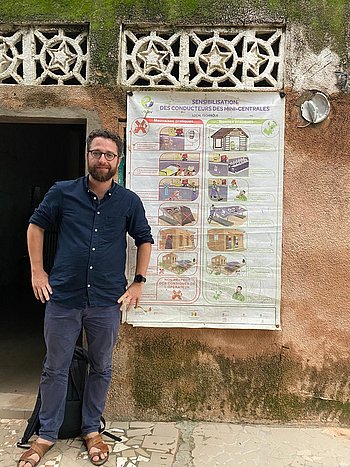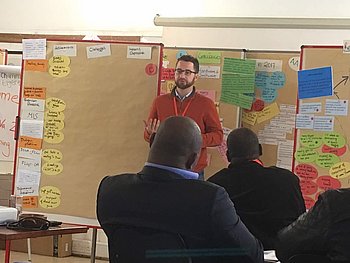Evaluators need to be highly structured, yet able to think outside the box
Keeping a critical distance is key

I worked in Zambia from 2016‒2018 as a development worker for GIZ. There, I worked as an advisor to the provincial administration with the aim of strengthening their ability to supervise the local authorities within the province. The decentralisation project run by GIZ was being carried out to support the Provincial Local Government Office (PLGO).
I was tasked with supporting the office in building up its capacities so that it could better perform its tasks. The primary aim was to strengthen knowledge management to make important information equally accessible to all stakeholders – from the ministry to local government. We also organised exchange forums to bring the local authorities and the PLGO together to discuss their challenges and develop solutions that both parties could agree upon.
During this time, I was able to gain an in-depth look into how Zambian local authorities worked and report back the challenges on the ground to the GIZ decentralisation project I was working on. A highlight of my work was the collaboration with our Zambian partners. I placed great importance on ensuring that I integrated well into their structures. We were in close contact and organised many joint workshops together, meaning that we were able to profit from their expertise when developing new systems and tools.
A global career
I was born in France and studied political sciences at Institut d'études politiques de Paris (Sciences Po Paris). A key focus of my studies was on urban development and it was in this field that I gained my initial professional experience. I went to India with the French volunteer service, where I worked to set up a twinning agreement between a town in India and a town in France. This initial contact with local authorities led to my interest in working for the GIZ in Zambia in 2016.
After returning from Africa in 2018 I worked as a cooperation officer in the French consulate in Quebec (Canada) for the French Ministry for Europe and Foreign Affairs. This position ended in 2020 – just as the Covid-19 pandemic began. It was clear to me that I no longer wanted to live and work outside of Europe; it was simply too far away from my family in France. Drawing on my positive experiences with GIZ, I began to consider Germany as a potential place to live.
I found a position with WWF in Hamburg, where I supervised a projection for protecting mangrove trees in East Africa.
A perfect match
In 2022 I came across a job advertisement for the Deutsches Evaluierungsinstitut der Entwicklungszusammenarbeit (DEval, German Institute for Development Evaluation) in Bonn. They were looking for an expert with the necessary experience to evaluate German decentralisation activities in Africa. I immediately realised that this position was perfect for me. The requirements for the job were a perfect fit with my experience in development service. So I applied – and got the job!
DEval is an independent body that evaluates German development cooperation measures. I am involved in all stages of the evaluation process. For example, we determine the questions that need to be answered in the initial design phase. I am then also responsible for carrying out the evaluation itself. In addition, a series of interviews is usually carried out with representatives from German development service and their partner organisations. To this end, I supervise the evaluators who carry out this work for us on-site. We also evaluate many documents containing information about the German projects and how they went as part of the evaluation.
Once we have collected and compiled all the relevant facts and perspectives, we begin analysing the data in order to provide the German Federal Ministry for Economic Cooperation and Development (BMZ) with valid information. This is another aspect of my job.
Working as an evaluator

For me, working as an evaluator is multi-dimensional. On the one hand, it requires you to be very structured, highly organised, and scientifically rigorous – after all, you must be able to back up your evaluation with solid evidence. On the other hand, you also need to be somewhat curious and creative – and be able to think outside the box. I did attend some courses on qualitative and quantitative research during my studies in Paris, but these were never my main focus. It was only through my work at DEval that I gained my first practical insights into methodological work.
However, evaluation work is more than simply observing and assessing numbers and facts. I believe that practical experience also plays an important role when it comes to evaluating development cooperation activities. My time in development service gave me a better sense of the dynamics on the ground – dynamics that are sometimes hard to represent in abstract, theory-heavy project documents. My experience also helps me deal with the cultural differences that we experience every day when communicating with our evaluators and interview partners in Africa.
This was something that became particularly apparent to me when I recently returned to Zambia to evaluate the support measures being carried out there by German development organisations. I was delighted to see that many colleagues from the partner organisations still remembered me and had positive memories of my time there in development service.
However, the experience did drive home the importance of maintaining a critical distance to whatever or whoever you are evaluating. The boundaries between “personal” and “professional” are very easily blurred and the potential for bias cannot be ruled out. This is no simple task when dealing with people that you know so well!
